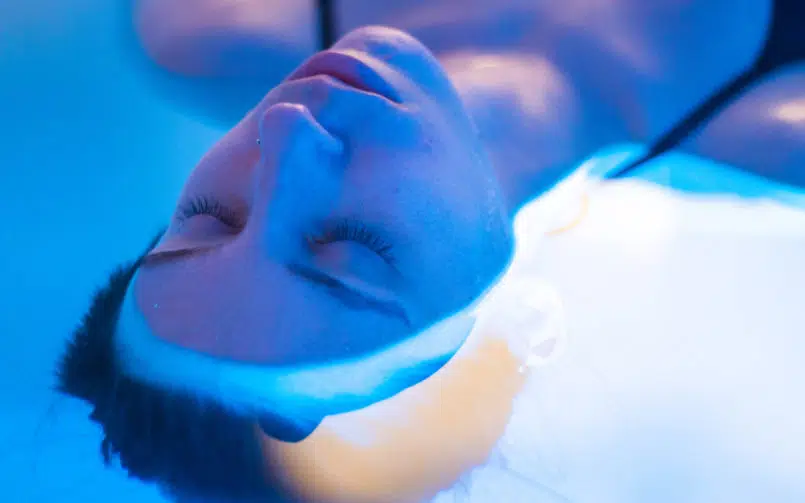TRUE REST FLOAT SPA
Top 3 Reasons Float Therapy is the Best for Muscle Recovery

One of the most common ways individuals rest their muscles is through relaxation. But whether your muscles need a break from a challenging workout or recovering from an injury, what is truly the best for muscle recovery? Of course, we could suggest resting on the couch or in the comfort of your bed as methods for taking it easy, but what about floatation therapy as a holistic approach?
One of the most common ways individuals rest their muscles is through relaxation. But whether your muscles need a break from a challenging workout or recovering from an injury, what is truly the best for muscle recovery? Of course, we could suggest resting on the couch or in the comfort of your bed as methods for taking it easy, but what about floatation therapy as a holistic approach?
For example, float therapy has been used by dozens of athletes to speed up their recovery time and get them back in the gym faster and better than ever. From the Cincinnati Bengals NFL team, Carl Lawson shared with reporters that he’s an avid fan of floating because, “It makes your body feel loose,” Lawson said. “You’re sitting in meetings all day, you’re going to practice. Just to be able to relax your body completely, relax every muscle in your body, the Epsom salts are supposed to be able to be good for you anyway.”
Other Olympic athletes who have used floatation therapy include Aly Raisman, Michael Phelps and Jade Johnson. And in addition, several sports teams use floatation therapy to help their athletes, most notably the Buffalo Bills, the Golden State Warriors, the New England Patriots and the Philadelphia Eagles.
We might not all be athletes, but some share the same interest in maximizing working out and preventing injuries. So, how does float therapy work for athletes, and why are all of these high-profile individuals and sports teams utilizing the practice as the best for muscle recovery, increased workout performance, mental concentration and more? If they can benefit, can everyone else?
The Epsom Salts
One of the minerals vital to life, but vast swaths of the population is deficient in, is magnesium. As a sulfate compound made of magnesium, sulfate and oxygen, Epsom salts release magnesium and sulfate ions into the water when dissolved. There are reports of these ions being absorbed into the skin, increasing people’s magnesium intake and helping solve several problems potentially caused by a magnesium deficiency.
Magnesium is also a vital part of our brain, heart and skeletal muscles. It can also be used to treat migraines, depression and asthma. For athletes, in particular, Epsom salts can provide muscle relaxation, which is one of the holistic treatments best for muscle recovery. With reduced tension in the muscles, people find that their pain from torn or overworked muscles is relieved.
Zero-Gravity Environment
Athletes are putting constant pressure on their joints and muscles with high-impact exercises. By placing the body in a zero-gravity environment of a floatation tank, with Epsom salts and skin temperature water, torn and tired muscles can fully relax without any pressure. This increases blood flow, allowing for the muscle tissue to mend faster.
The full-body relaxation experience also reduces widespread pain throughout the body. A study also found that blood lactate production was significantly decreased after a float session, giving athletes the ability to get back to training sooner.
As we work out, whether it’s through cardio exercise or strength training, our muscles create micro-tears that can be beneficial to strengthening and toning. But it’s important not to overexert yourself, or you could risk tearing a muscle. When the body recuperates from exercising or heavy labor, we don’t risk having to forgo working out.
So, a zero-gravity environment can indeed be the best for muscle recovery, pre-and post-workout recovery and supporting the body’s needs to relax.
Mental Benefits
With a lack of external stimuli, the brain can relax. No longer needing to devote resources to processing our senses, those who float report experiences of profoundly reduced stress. Positive neurochemicals are produced, and some report a feeling of ‘euphoria’ washing over them during their float session.
A study done on university athletes found that athletes who used float therapy saw improved mood and perceived soreness compared to athletes who did not float. They also reported better sleep cycles after floating. In addition, athletes who are mentally ready to train hard are more likely to have successful workouts, and floatation therapy can help your brain muscles get ready for your next session.
It might not seem likely that mental health has anything to do with the physical body. After all, working out is about shaping our physical bodies. But workouts can be tricky and challenging, and when we’re hyper-aware and focused, we’re more likely to have a better workout and reduce distractions. Conversely, being distracted can lead to injury, and a loss of concentration can be why an athlete loses their competition or someone at the gym not meeting their goals.
Floatation therapy is a great way to let your body rest and recover after a strenuous workout. It’s a holistic therapy and one of the best for muscle recovery, concentration, relaxation, stress reduction, excellent athletic performance, and overall maintaining a happy, healthy mind, body and spirit.
Even without a challenging workout regimen for those who don’t work out often, there are still numerous benefits that floatation therapy can provide.
With over 37 locations across the country, the ability to experience rest, relaxation and rejuvenation is more accessible than ever. Please visit https://truerest.com/locations/ to find a True REST Float Spa closest to you and book your appointment for true REST, recuperation and rejuvenation today.